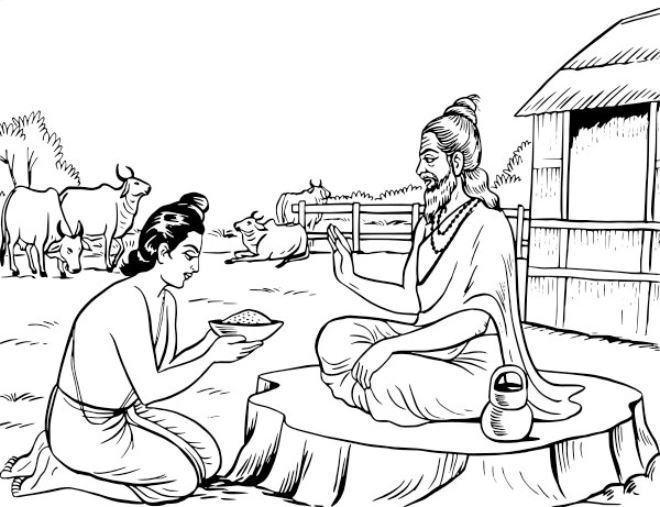I will relate to you a very ancient story from the Chandogya Upanishad, which tells how knowledge came to a boy. The form of the story is very crude, but we shall find that it contains a principle.
A young boy said to his mother, ‘I am going to study the Vedas. Tell me the name of my father and my caste.’
The mother was not a married woman, and in India the child of a woman who has not been married is considered an outcast; he is not recognised by society and is not entitled to study the Vedas.
So the poor mother said, ‘My child, I do not know your family name; I was in service, and served in different places; I do not know who your father is, but my name is Jabala and your name is Satyakama.’
The little child went to a sage and asked to be taken as a student. The sage asked him, ‘What is the name of your father, and what is your caste?’
The boy repeated to him what he had heard from his mother.
The sage at once said, ‘None but a Brahmin could speak such a damaging truth about himself. You are a Brahmin and I will teach you. You have not swerved from the truth.’ So he kept the boy with him and educated him.

Now come some of the peculiar methods of education in ancient India. This teacher gave Satyakama four hundred lean, weak cows to take care of, and sent him to the forest. There he went and lived for some time. The teacher had told him to come back when the herd would increase to the number of one thousand.
After a few years, one day Satyakama heard a big bull in the herd saying to him, ‘We are a thousand now; take us back to your teacher. I will teach you a little of Brahman.’
‘Say on, sir,’ said Satyakama.
Then the bull said, ‘The East is a part of the Lord, so is the West, so is the South, so is the North. The four cardinal points are the four parts of Brahman. Fire will also teach you something of Brahman.’
Fire was a great symbol in those days, and every student had to procure fire and make offerings. So on the following day, Satyakama started for his Guru’s house, and when in the evening he had performed his oblation, and worshipped at the fire, and was sitting near it, he heard a voice come from the fire, ‘O Satyakama.’
‘Speak, Lord,’ said Satyakama. (Perhaps you may remember a very similar story in the Old Testament, how Samuel heard a mysterious voice.) ‘O Satyakama, I am come to teach you a little of Brahman. This earth is a portion of that Brahman. The sky and heaven are portions of It. The ocean is a part of that Brahman.’
Then the fire said that a certain bird would also teach him something. Satyakama continued his journey and on the next day when he had performed his evening sacrifice a swan came to him and said, ‘I will teach you something about Brahman. This fire which you worship, O Satyakama, is a part of that Brahman. The sun is a part, the moon is a part, the lightning is a part of that Brahman. A bird called Madgu will tell you more about it.’
The next evening that bird came, and a similar voice was heard by Satyakama, ‘I will tell you something about Brahman. Breath is a part of Brahman, sight is a part, hearing is a part, the mind is a part.’
Then the boy arrived at his teacher’s place and presented himself before him with due reverence.
No sooner had the teacher seen this disciple than he remarked: ‘Satyakama, thy face shines like that of a knower of Brahman! Who then has taught thee?’
‘Beings other than men,’ replied Satyakama.
‘But I wish that you should teach me, sir. For I have heard from men like you that knowledge which is learnt from a Guru alone leads to the supreme good.’
Then the sage taught him the same knowledge which he had received from the gods. ‘And nothing was left out, yea, nothing was left out.’